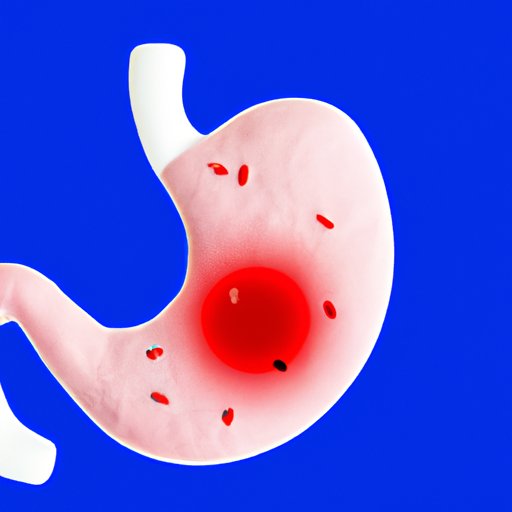
I. Introduction
Most of us have experienced digestive discomfort at some point in our lives, but sometimes that discomfort can be a sign of a more serious condition, such as stomach ulcers. Stomach ulcers are sores that occur on the lining of the stomach and can cause pain and discomfort. In this article, we will be discussing what stomach ulcers are, the factors that cause them, their symptoms, risk factors, healthy eating tips to avoid them, and medical treatment options.
II. Factors that cause Stomach Ulcers
Stomach ulcers can be caused by various factors such as:
H. Pylori Bacteria
Helicobacter pylori (H. pylori) is a type of bacteria that can cause stomach ulcers. These bacteria live in the stomach lining and weaken the protective mucus layer that shields the stomach from digestive acids. When the stomach lining is exposed to digestive acids, it can cause sores or ulcers.
Regular Use of Nonsteroidal Anti-inflammatory Drugs (NSAIDs)
Long-term use of NSAIDs, such as aspirin and ibuprofen, can cause stomach ulcers. These drugs reduce the stomach’s ability to produce protective mucus, which leaves the lining exposed to digestive acids.
Excessive Alcohol Consumption
Excessive alcohol consumption can irritate the stomach lining and cause ulcers. Alcohol also increases the production of digestive acids in the stomach, which can make the condition worse.
III. Symptoms of Stomach Ulcers
The symptoms of stomach ulcers include:
- Burning or gnawing pain in the stomach, which can be worse at night or when the stomach is empty
- Nausea and vomiting
- Loss of appetite and weight loss
- Bloating and abdominal fullness
- Burping or acid reflux
It is important to recognize these symptoms early as complications can occur if left untreated.
IV. Risk Factors that Contribute to Stomach Ulcers
Some of the risk factors that can contribute to stomach ulcers include:
Smoking
Smoking weakens the stomach lining and can increase the risk of stomach ulcers. Smoking also slows down the healing process of existing ulcers.
Stress
Chronic stress can interfere with the body’s natural healing processes. It is also common for people to engage in unhealthy habits, such as overeating or drinking, when under stress.
Age
The risk of stomach ulcers increases with age. The stomach lining thins as we age, which can make the stomach more susceptible to digestive acids.
V. Healthy Eating Tips to Avoid Stomach Ulcers
Adopting healthy eating habits can help avoid stomach ulcers. Some tips include:
Eating a Balanced Diet
Eating a diet rich in whole grains, fruits, vegetables, and lean proteins can provide the body with the nutrients it needs to heal and stay healthy.
Avoiding Trigger Foods
Foods that can cause or worsen stomach ulcers include spicy foods, fried foods, acidic foods, and caffeine. Avoiding these foods can help prevent stomach ulcers.
Limiting Alcohol and Caffeine
Limiting alcohol and caffeine intake can help reduce the risk of stomach ulcers.
VI. Medical Treatment Options for Stomach Ulcers
Medical treatment options for stomach ulcers include:
Antibiotics
If H. pylori bacteria are the cause of stomach ulcers, antibiotics will be prescribed to eliminate the bacteria and clear the infection.
Acid-Reducing Medications
Acid-reducing medications, such as proton pump inhibitors (PPIs) and H2 blockers, can help reduce the amount of acid in the stomach, giving the stomach lining time to heal.
Lifestyle Changes
Lifestyle changes such as quitting smoking, reducing stress, and following a healthy diet can also help in the healing process of stomach ulcers.
VII. Conclusion
In conclusion, stomach ulcers can be painful and disruptive to daily life. Identifying the causes, symptoms, and risk factors associated with stomach ulcers can help you take the necessary steps to prevent the condition from occurring or treat it if you have already been diagnosed. If you experience symptoms such as persistent abdominal pain, vomiting, or difficulty eating, it is important to seek medical attention immediately. Consult a healthcare professional on the best course of treatment for your particular case.





